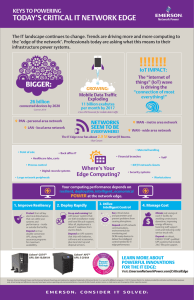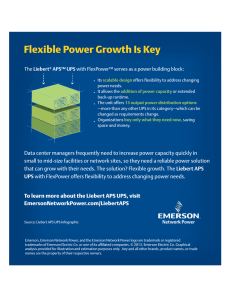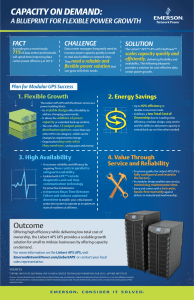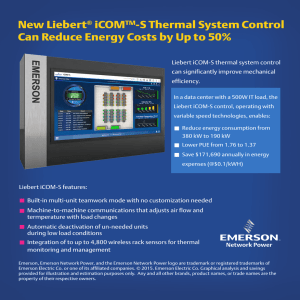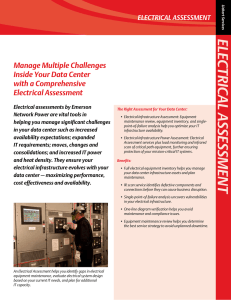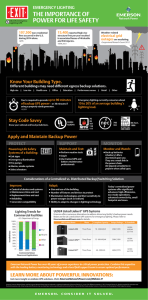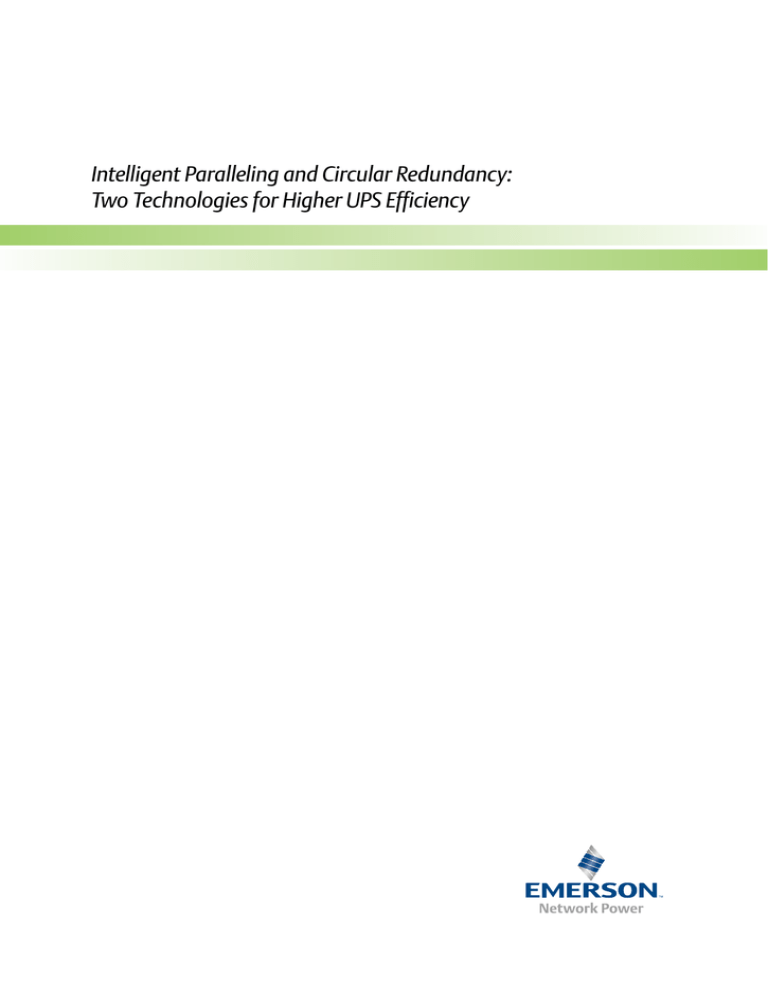
Intelligent Paralleling and Circular Redundancy:
Two Technologies for Higher UPS Efficiency
Executive Summary
In order to optimize the energy used by an Uninterruptible Power Supply (UPS), Emerson Network Power has
developed proprietary technologies named Intelligent Paralleling for monolithic UPS and Circular Redundancy
for modular scalable UPS. Both technologies are capable of delivering higher operating system efficiency without
compromising reliability and availability.
This white paper will focus on these particular technologies to improve the UPS operating efficiency when the unit
is working at a reduced system capacity, which is the typical condition in a data center.
Through the Intelligent Paralleling and Circular Redundancy modes the UPS will automatically adapt and optimize
the energy consumption improving the system’s efficiency according to the actual load demand.
2
Intelligent Paralleling
The Intelligent Paralleling technology allows the
UPS to optimize the double conversion efficiency
when operating at partial load down to very low load
percentages, achieving superior cost savings and
reducing TCO.
Activating the Intelligent Paralleling mode allows
the system to automatically adapt capacity to meet
immediate load requirements by measuring the system
output current and the real power needed by the load
downstream, in order to switch excess units to standby
mode, while ensuring continuous system availability.
When units are running in an idle state, they are not
completely switched off but they still have the inverter
control active and synchronized, as well as the DC bus
charged in order to be ready to start up in case of load
increase. When idle units are activated, the remaining
active units will continue to supply the load without
AC
Mains
AC
Mains
AC
Mains
any interruption supporting a temporary overload
condition. Obviously, the specific load thresholds and
tolerances used by the Intelligent Paralleling algorithm
can be customized to meet specific customer
requirements in terms of available power, redundancy
and reliability levels.
Furthermore, the Intelligent Paralleling mode allows
each UPS unit to operate in standby for the same
amount of time, ensuring an equal life-span of module
components.
Here below in figure 1 and figure 2 is shown an example
of the Intelligent Paralleling mode enabled on the
Liebert® 80-eXL model considering 400 kVA units. We can
observe that through the Intelligent Paralleling mode,
the difference in terms of average system operating
efficiency brings a financial saving greater than 2,700 €*
over the first year (*with an energy cost of 0.1 €/kWh and
an air conditioning coefficient equal to 20%).
AC
Mains
33%
AC
Mains
AC
Mains
AC
Mains
AC
Mains
65%
System output
Figure 1. Liebert 80-eXL Intelligent Paralleling: distributed
parallel UPS configuration with four 400 kVA units at 33% load
each, achieving overall system efficiency around 96%.
System output
Figure 2. Liebert 80-eXL Intelligent Paralleling: two 400 kVA units
at 65% load each, system efficiency around 96.8%.
Z3
zoom (C1)
100 V/div
10.0 ms/div
313 V
330 V
∆y
17 V
Tbase
0.00 s
Roll
2.00 s/div
1.00MS
50 kS/s
Z3
zoom (C2)
100 V/div
10.0 ms/div
313 V
330 V
∆y
17 V
Trigger
Stop
Edge
Z3
zoom (C3)
100 V/div
10.0 ms/div
313 V
330 V
∆y
17 V
C1 DC
0V
Positivo
Figure 3. Waveform of a system made of three (3) Liebert 80-eXL 500 kW after two (2) idle units are activated.
3
Circular Redundancy
For modular, scalable UPS such as Emerson Network
Power’s Trinergy™ and the latest Trinergy™ Cube,
the Circular Redundancy mode works with the same
philosophy of the Intelligent Paralleling technology for
monolithic units.
Leveraging its modular architecture, the UPS unit
defines the necessary number of modules (CORES)
to supply the load and sets the remaining CORES in a
special idle state, maintaining also the requested level
of redundancy.
Similarly to the Intelligent Paralleling mode, also the
Circular Redundancy technology ensures that the
stand-by CORES have the inverter control active and
synchronized, as well as the DC bus charged in order
to be ready to start-up in case of load increase. Under
this condition when one sleeping module is activated,
while the unit is in Circular Redundancy mode, the
remaining CORES will continue to supply the load with
100% Load
All Cores are in operation
no interruption, while at the same time addressing
specific capacity, redundancy and reliability needs of
the critical infrastructure.
It is important to note that Circular Redundancy powers
only the minimum number of inverters required at
that load level, ensuring a periodic turnover of all the
available CORES. Therefore, through an auto-detection
feature which monitors the operating time of each
module embedded within the UPS algorithm, the idle
CORES are rotated in order to ensure the same ageing
for all module components part of the system.
For example, in figure 4, the Circular Redundancy
technology applied on a 1.6 MVA Trinergy Cube UPS
is shown. Compared to a configuration with all CORES
in operation, it allows a difference in terms of average
system operating efficiency leading to a financial saving
greater than 3,200 €* over the first year (*with an
energy cost 0.1 €/kWh and an air conditioning coefficient
equal to 20%).
Figure 4. Example of Trinergy Cube Circular Redundancy for a 1.6 MVA UPS system.
4
50% Load
Two Cores in idle state, two Cores in operation
Conclusion
Emerson Network Power’s Intelligent Paralleling and
Circular Redundancy technologies further improve
UPS operating system efficiency at typical load
conditions, without compromising system reliability
and availability.
Other methods used to maximize system efficiency,
as for example running UPS via ECO mode operation,
have a very limited scope of application with modern
mission critical load types and are not providing any
power conditioning to the load downstream. On the
contrary, energy saving technologies such as Intelligent
Paralleling and Circular Redundancy offer the maximum
level of load protection and power conditioning being
a real alternative solution to the standard double
conversion mode (VFI) or line interactive mode (VI),
keeping financial and environmental costs associated
to the energy consumption to a minimum optimal
value, always in line with the actual load demand.
Within the medium and large UPS product portfolio,
Emerson Network Power offers different UPS
platforms meeting specific customer and installation
requirements, including both monolithic T-free and
T-based models and modular scalable T-free UPS up to
3 MW (see figure 5 here below for product details).
All of these products are equipped with energy
saving features as Intelligent Paralleling or Circular
Redundancy to maximize efficiency at partial load
operation to reduce the overall total cost of ownership
(TCO).
Liebert® 80-eXL
Liebert® NXL
Trinergy™ Cube
Product Architecture
Monolithic T-free
Monolithic T-based
Modular Scalable T-free
Power Range
160-500 kW
400-800 kVA
150-3000 kW
Modular Energy saving
System
Intelligent Paralleling
Intelligent Paralleling
Circular Redundancy
VFI Efficiency
Up to 96.8%
Up to 94%
Avg. 98.5%(1)
1 Year Saving(2) using the
Modular Energy Saving
System
>2,700 €
>2,000 €
> 3,200 €
Energy Saving Mode
Advantages
•Higher system operating efficiency at partial load
•System capacity automatically adapted to the real load requirement
•Lower Opex and reduced TCO
(1) Average operating efficiency as a result of the Trinergy Cube three functioning modes (VFI, VFD, VI)
(2) Four units/modules in parallel with two in idle state, energy cost 0.1 €/kWh, air conditioning coefficient equal to 20%.
Figure 5. Emerson Network Power’s product offering with Intelligent Paralleling and Circular Redundancy energy saving technologies
available as standard.
5
Ensuring The High Availability
Of Mission-Critical Data And Applications.
About Emerson Network Power
Emerson Network Power, a business of Emerson (NYSE:EMR), is
the world’s leading provider of critical infrastructure technologies
and life cycle services for information and communications
technology systems. With an expansive portfolio of intelligent,
rapidly deployable hardware and software solutions for power,
thermal and infrastructure management, Emerson Network Power
enables efficient, highly-available networks.
Learn more at www.EmersonNetworkPower.eu
Locations
Emerson Network Power
Global Headquarters
1050 Dearborn Drive
P.O. Box 29186
Columbus, OH 43229, USA
T +1 614 8880246
Emerson Network Power
Europe Middle East And Africa
Via Fornace, 30
40023 Castel Guelfo (BO) Italy
Tel: +39 0542 632 111
Fax: +39 0542 632 120
ACpower.Networkpower.Emea@Emerson.com
Emerson Network Power
United Kingdom
George Curl Way
Southampton
SO18 2RY, UK
T +44 (0)23 8061 0311
F +44(0)23 8061 0852
While every precaution has been taken to ensure accuracy and completeness herein,
Emerson assumes no responsibility, and disclaims all liability, for damages resulting
from use of this information or for any errors or omissions.
Specifications subject to change without notice.
EmersonNetworkPower.eu
Globe Park
Fourth Avenue
Marlow Bucks
SL7 1YG
Tel: +44 1628 403200
Fax: +44 1628 403203
UK.Enquiries@Emerson.com
Follow us on Social Media:
Emerson. Consider it Solved, TrinergyTM, Liebert®, Emerson Network Power and the Emerson Network Power logo are trademarks and service marks of Emerson Electric Co. or one of its affiliated companies.
©2015 Emerson Electric Co. All rights reserved.

